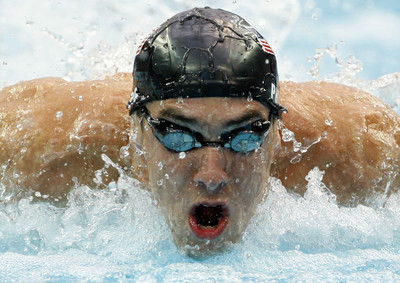Phelps touches history

BEIJING — By a blink.
By the tip of a fingernail.
By a final stroke of major controversy.
That is the margin by which Michael Phelps delivered his historic swimming resume to the doorstep of a place no other Olympian has entered.
He will walk inside and make himself at home Sunday, because eight gold medals in a single Olympic Games is now as much a lock as red flags waving throughout this city.
Phelps tied Mark Spitz’s 1972 feat today by winning his seventh gold here in a most dramatic fashion, chopping his arm through water one final time to claim the 100-meter butterfly in 50.58 seconds.
It was the only time he led, if he ever led at all.
The scoreboard posted Phelps’ time as a hundredth of a second ahead of Serbian Milo Cavic, but the swimmers had barely turned to read the results when debate began swirling around the Water Cube.
There was a strong opinion that Cavic touched first but that his initial brush of the wall wasn’t hard enough to activate the electronic timer. His team filed a protest, which was denied after FINA officials studied a replay. They said it was a matter of one final stroke to the wall for Phelps and one final glide for Cavic.
By his final fingertip, Phelps matched the mark set by Spitz in the Munich Games.
“Dream as big as you can dream and anything is possible,” he said. “I am sort of in a dream world. Sometimes I have to pinch myself to make sure it is real.”
It’s real. The postrace replays proved it.
“The timer,” FINA referee Ben Ekumbo said, “was in perfect condition. There is no doubt. It was clear the Serbian finished second to Michael Phelps. The Serbians were satisfied with our (explanation) and agreed.”
FINA executive director Cornel Marculescu added: “Michael Phelps is our greatest ever. There is no doubt about that. He would be first in the race no matter what. On Sunday, he will become like extra-terrestrial or something.”
Oh. OK.
Phelps has seven golds because he is swimming’s best finisher. He is faster over his final 50 meters than his first, which is why few held their breath today when he made the final turn seventh out of eight swimmers.
“I knew he would chase me down,” Cavic said. “I saw his shadow out of the corner of my goggles. I knew he was coming. I just put my head down and didn’t breathe the final eight meters. I just hoped for the best.
“I don’t want to fight (the results). You can’t even show the difference of a hundredth second. It’s just too fast.”
Phelps said he was fearful he had blown the finish by making a wrong decision.
“When I did chop the last stroke, I thought that had cost me the race,” he said. “But it was actually the opposite. If I had glided, I would have been way too long. I took short, faster strokes to try to get my hand on the wall. I ended up making the right decision.
“I saw the replay. I saw it frame by frame on the computer. It’s almost too close to see. One hundredth of a second is the smallest margin of victory in our sport. It was pretty cool, that’s all I can say.”
What the timer ultimately guaranteed is Phelps going for his record eighth gold Sunday in the 400 medley relay, which the U.S. has never lost in the Olympics unless denied by an American boycott (1980 in Moscow). There isn’t more of a sure thing around here than this team in this event.
Overshadowed by Phelps, two more world records fell on the next-to-last day of swimming.
Rebecca Adlington of Britain won gold in the 800 freestyle, breaking Janet Evans’ 19-year-old world record — the oldest in swimming. Adlington touched in 8:14.10 to crush the mark of 8:16.22 set by the American in Tokyo on Aug. 20, 1989.
Kirsty Coventry of Zimbabwe finally won a gold in Beijing, retaining her Olympic title in the 200 backstroke with a world record of 2:05.24. She lowered the mark of 2:06.09 set by silver medalist Margaret Hoelzer last month.
No one was happier than Cesar Cielo, who won Brazil’s first swimming gold with an upset in the 50 freestyle. He broke down crying on the medal stand and was mobbed by his teammates on deck.
He won in 21.30, lowering his own Olympic mark of 21.34 that he set in the semifinals.
Also, 41-year-old Dara Torres of the U.S. cruised into the final of the 50 free with the fastest semifinal time, 24.27. Australian teenager Cate Campbell was second at 24.42.
The Associated Press contributed to this report.